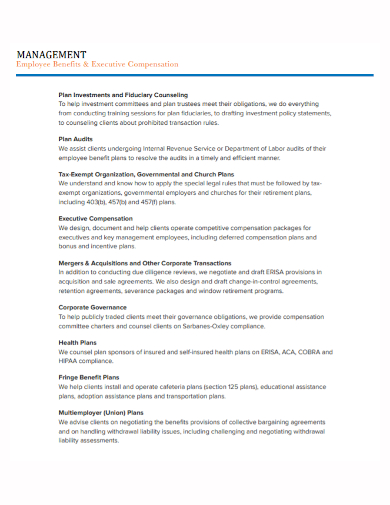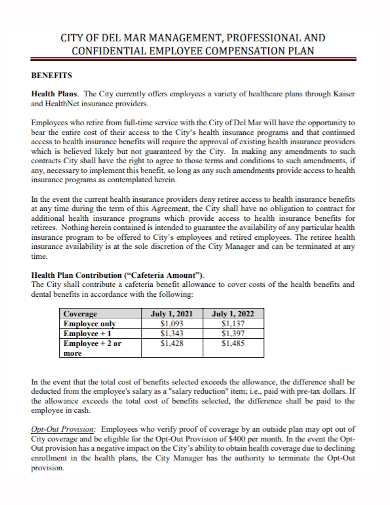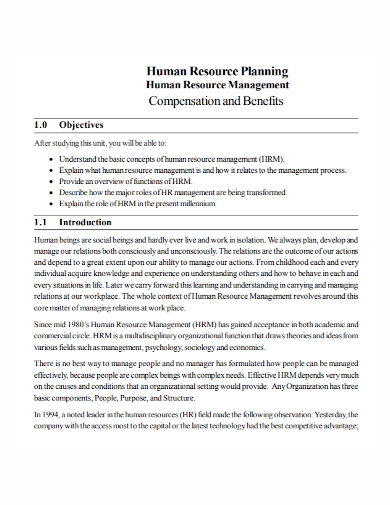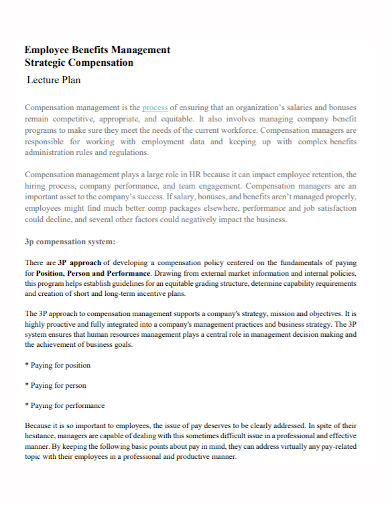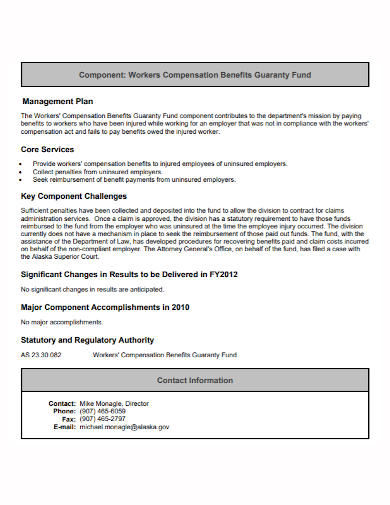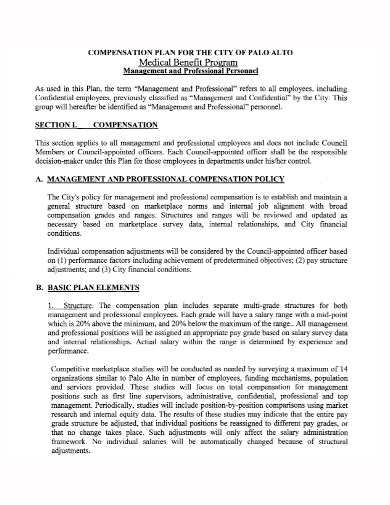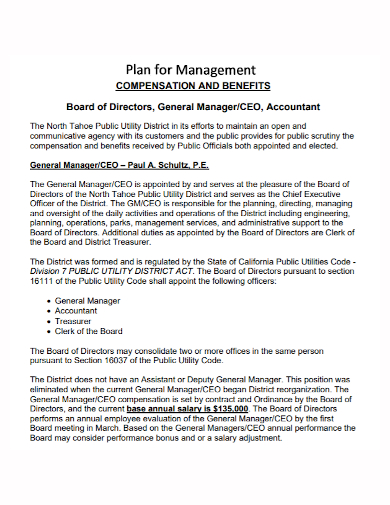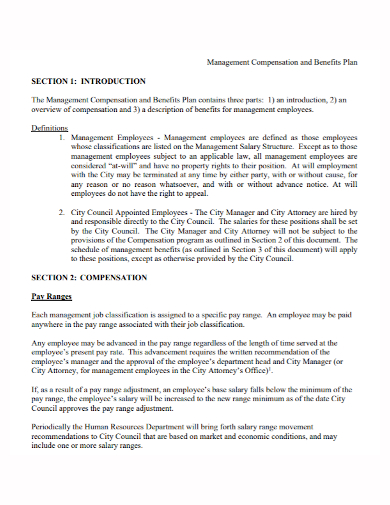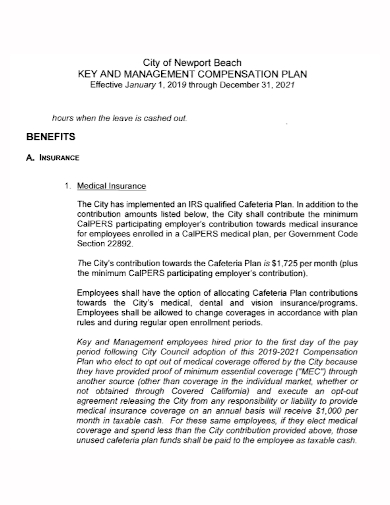All people from different walks of life find jobs to earn money to be able to support themselves and their families. Nobody works for free and at most times, people complain if their compensation is way less than the work they put in for their employer, much more if they don’t receive any benefits that they very much deserve to receive. This type of arrangement encourages people to leave their employers to look for better ones that pay more and discourages job seekers to apply for them when they find out that there is no proper compensation. Companies would want to stay competitive and so the management and the human resources are assigned to do the research and creation of a plan to make a standard procedure for benefits and compensation for employees. This article will guide you on how to create one.
9+ Benefits and Compensation Management Plan Samples
1. Benefits and Compensation Management Plan Template
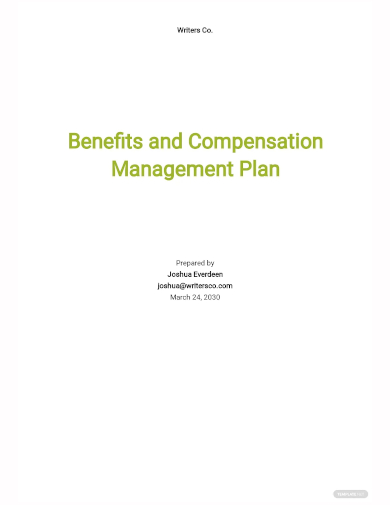
2. Benefits and Executive Compensation Management Plan
3. Benefits and Employee Compensation Management Plan
4. HR Benefits and Compensation Management Plan
5. Benefits and Strategic Compensation Management Plan
6. Benefits and Workers Compensation Management Plan
7. Benefits Program and Compensation Management Plan
8. Benefits and Compensation Plan for Management
9. Management Compensation and Benefits Plan
10. Medical Benefits and Compensation Management Plan
What is a Compensation Plan?
A compensation plan is a document that outlines the compensatory components of a company such as the employees’ wages, salaries, benefits, and terms of payment and explains how they will be distributed to support a business strategy, attract qualified candidates to apply to be part of the company, use as a motivator for employees to perform better, and keep the business competitive in the market. competitiveness within the industry, operating objectives, and staff needs.
How to Create a Benefits and Compensation Plan
- Identify Your Objectives: Your outline should have the main objective that you plan to achieve by providing certain targets to accomplish it. Set an objective for your program and certain targets.
- List All Job Descriptions: The next thing to do is to write down each job description in every department of your organization and set a generalized budget for that department. Outline the different tiers for every classification of the positions starting from the executives and going to the subordinate levels. After you’ve identified their tiers, you can then make strategies to develop opportunities for these positions for career advancement. Focus more on the entry levels who need to advance from their level.
- Decide on the Salary Range: You can now assign pay rates and a salary range for each position and job classification for employees. You can base your budget for every department to help you figure out the amount of the salary range.
- Make Policies: Create policies related to payroll, benefits, and other compensation-related points. Several policies related to payroll, fringe benefits, and other pay-related matters are impacted by a compensation plan. For example, companies often have policies for paid holidays, healthcare benefits, payroll administration, and company-issued pay advances that need to factor into or at least align with the company’s compensation policy.
- Develop a communication plan: Before releasing the plan for all your employees to know and learn about your benefits and compensation plan and all the policies and programs that go along with it, create a communication plan of which you can use to effectively communicate with your employees and share then plan through email, social media, memos, etc. Expect that there will be questions, concerns, and suggestions that may arise from them so be sure to outline a process on how you will address each person. Make sure the plan is understandable for everyone to avoid further miscommunication.
FAQs
What are the different types of direct compensation?
The four types of direct compensation are:
- Salary: This is the most common method for employees employed in a company or establishment. Employees are given a certain amount of salary as a payment for the duties they do for the company.
- Hourly pay: This is another way of paying employees by giving them payment based on the number of hours they work for a company.
- Commission: This is a type of payment where an employee is paid extra for their high level of performance in their work. This is more common in sales work.
- Bonus pay: Another way to increase the productivity of an employee for their performance in the company.
What are some examples of indirect compensation?
Indirect compensation is the type of compensation that doesn’t involve money. Some examples of indirect compensation are:
- Disability income protection
- Vacation days or paid time off (PTO)
- Paid holidays
- Flexible working hours or scheduling
- Promotion opportunities
- Student loan assistance
- Assistance with child care expenses
- Relocation benefits
- Company car and equipment
Why do you need to create a benefit and compensation plan?
Creating a benefit and compensation plan is beneficial for your organization. It can increase productivity, loyalty, recruitment, and retention among your employees.
Once you’re done drafting the plan, make sure to review it for any errors or inaccurate information before you gather your team and discuss the plan with them. Make your plan flexible for any updates or changes in case if your superior wants to add or reduce some information and if you need to include suggestions or recommendations from your colleagues. To help you get started making the contract, download our free sample templates above to use as your guide!
Related Posts
FREE 10+ Scope Management Plan Samples
FREE 10+ Transport Management Plan Templates
FREE 10+ Operations Management Plan Templates
FREE 9+ Crisis Plan Samples
FREE 9+ Sample Quality Management Plan
FREE 8+ Sample Behavior Management Plan
FREE 8+ Sample Risk Management Plan
FREE 4+ Sample Configuration Management Plan
FREE 19+ Construction Management Plan Samples
FREE 13+ Communication Management Plan Samples
FREE 12+ Sample Classroom Management Plan
FREE 10+ Clinical Quality Management Plan Samples
FREE 10+ Construction Safety Management Plan Samples
FREE 9+ Sample Risk Management Plan
FREE 7+ Chronic Disease Management Plan Samples

